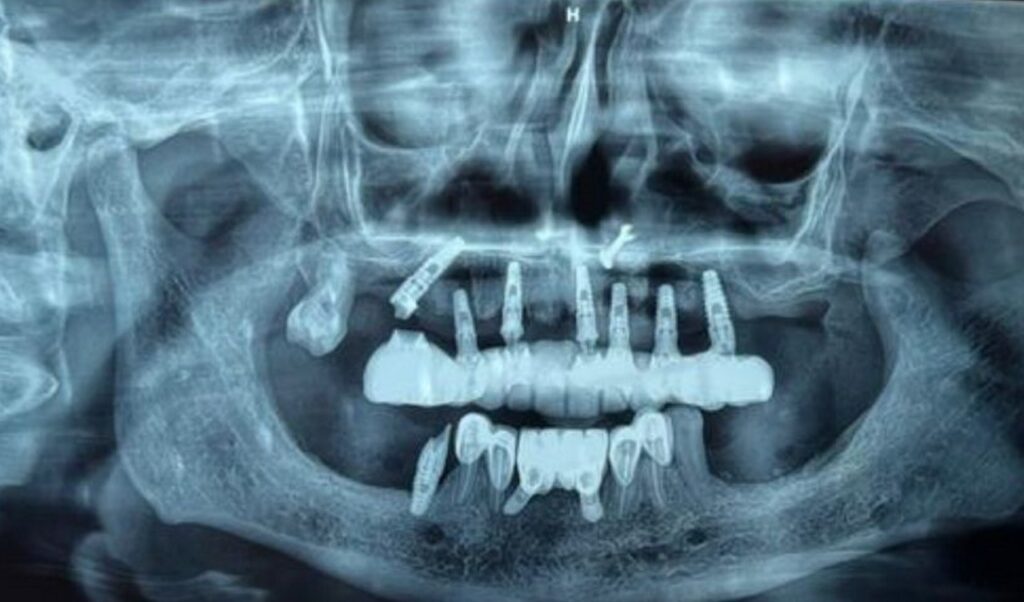
An implant-supported restoration offers a predictable treatment for tooth replacement with high success rates. However, there are cases of implant failures as well.
A failed dental implant is an unusual situation, but it does occur. In fact, our clinic has seen more than 10 cases of a failed implant every month now. The following is an unfortunate case of an elderly lady with 7 failed implants in the upper jaw superimposed with infection and mobile prosthesis.
An elderly woman in her fifth decade had reported to us with a loose implant supported denture and inability to eat since the last month. On examination, we found that a total of 7 implants were placed in the upper jaw, most of which were completely dislodged from the socket and few of them were loosely attached. However, none of the 7 implants were completely inside the bone (where they are supposed to be, ideally). Periimplantitis was evident, especially in the anterior area. The overall occlusion was completely unbalanced and asymmetrical. The radiographic interpretation confirmed the clinical diagnosis. There was no data provided by the patient which could facilitate us to understand the technicalities of the treatment done. The unavailability of the data is due to negligence in record keeping by the patient.
The patient is currently undergoing treatment in our clinic at Dr. Rajat Sachdeva’s dental clinic in Ashok Vihar and her condition has considerably improved. Our main motive of bringing this case to light is to educate our patients regarding the importance of implant maintenance and follow-up.
Once the implants have been placed in your mouth, routine maintenance, recall evaluations and radiographs are necessary to insure the long life of these restorations. These follow up appointments are usually scheduled by your dentist at selected intervals to assist the patient in maintaining oral implant health. There are some at-home hygiene measures that needs to be undertaken by the patient to ensure a healthy implant. Brushing and flossing are the two ultimate techniques by which the patient can take care of their third dentition (just like natural teeth).
Having said this, there are other important factors or reasons which can adversely affect the health of an implant.
We have listed a few common causes of failed dental implants and we strongly advise our implant patients against them-
• Gum disease (Peri-Implantitis)
• Bruxism (Teeth Grinding)
• Osteoporosis
• Cancer treatment/Radiation Therapy
• Some medications
• Smoking
• Inadequate imaging
• Incomplete medical Information
Effects from causes like chemotherapy and other medications can be successfully subsided by maintaining a good oral hygiene and regular dental visits.
Through this article, we would also like to educate our patients regarding the early signs of a failing implant, so that they can contact us at the earliest. Mobility is often the first sign of a failing implant. This happens because the bone is not growing properly around the implant. Initially there might be only very little mobility which can be recognized only by a dentist, but over time an implant that has failed to integrate will feel completely loose and may move when the person chews or talks. A totally failed implant will be consistently movable.
Other signs of a dental implant that has lost attachment with bone may include pain, swelling or infection, but that’s not always the case. An X-ray of a failed implant will usually show the bone loss around the implant. So if the dentist notices any mobility in the implant, he will advise to do an X-ray to examine the bone growth.
We would also like to take this opportunity to remind our patients regarding the importance of record maintenance.
Your dental record is an official document given by the dentist that maintains a history of all office visits, diagnoses, treatment plans, procedures and communications between you and your dentist. It contains your past x-rays and information about all treatments you have received, such as fillings, crowns and bridges and implants. When a patient comes to us and doesn’t have proper records from your previous dentist, we just depend on what can be deduced by looking at your mouth and talking to you. And that may not be the best way to get detailed information.
Without proper written records, most of the information you provide to us relies on your memory and you’ll need to recall names and dates of present and past symptoms, procedures, medications and recommendations. And let’s face it, how many people can describe exactly when they first noticed a certain symptom, how it progressed, when they saw the dentist about it, and how it was treated — especially when they don’t have a background in the science of dentistry? These details are important because these are the factors that might affect our treatment plan.
It’s your responsibility to request for all your dental records including x-rays, medical prescriptions and any other detail of the treatment done from your dentist. Do your part to ensure you receive the best care possible by making sure your dental records follow you wherever you go.